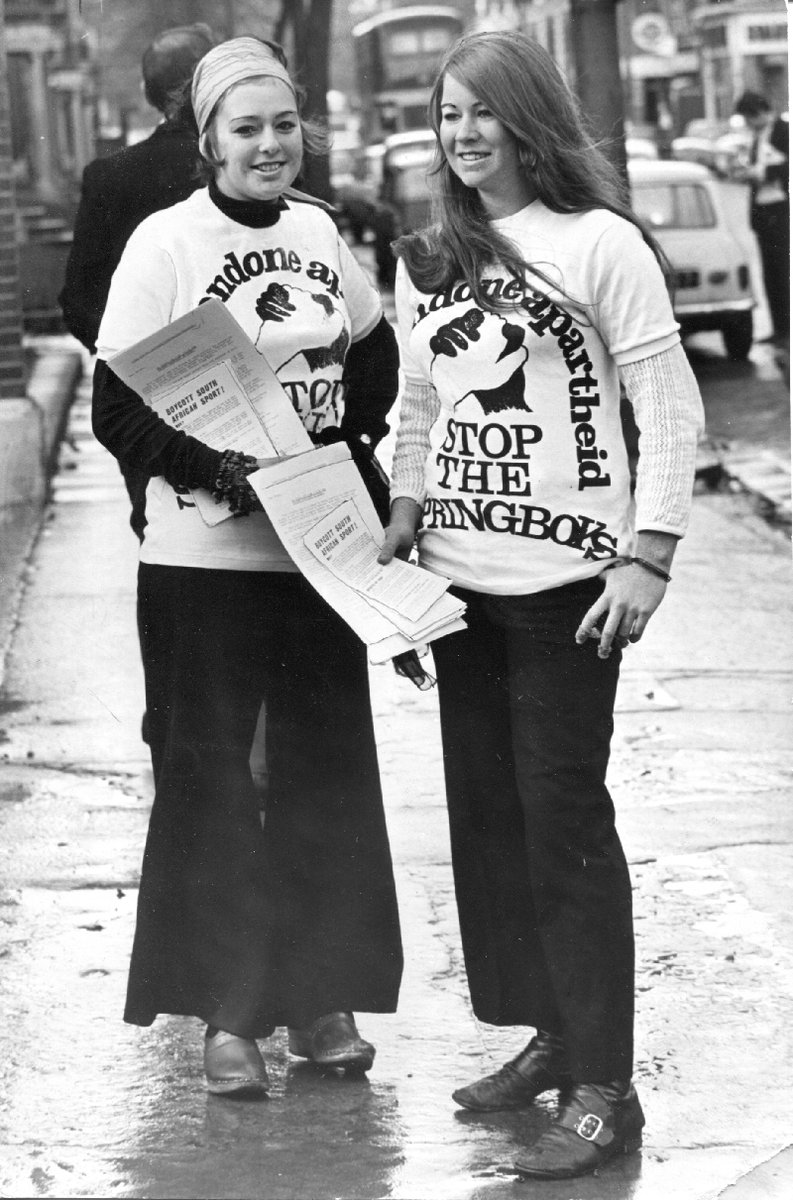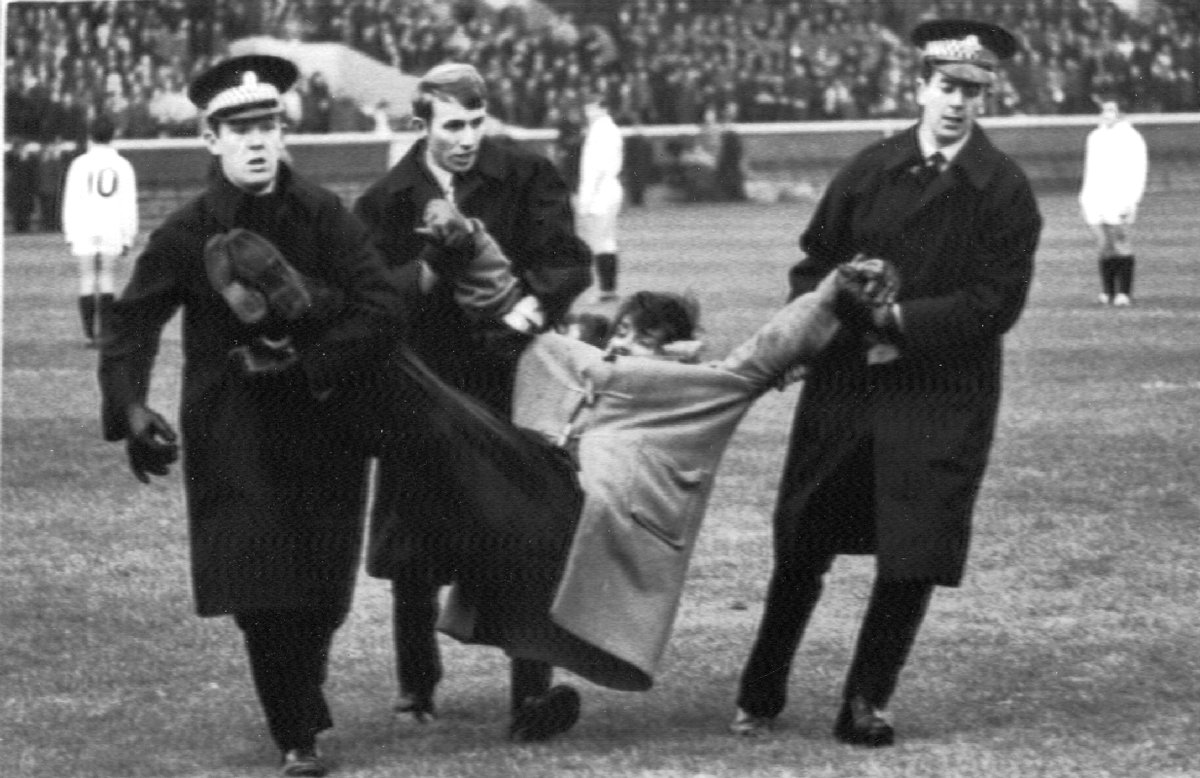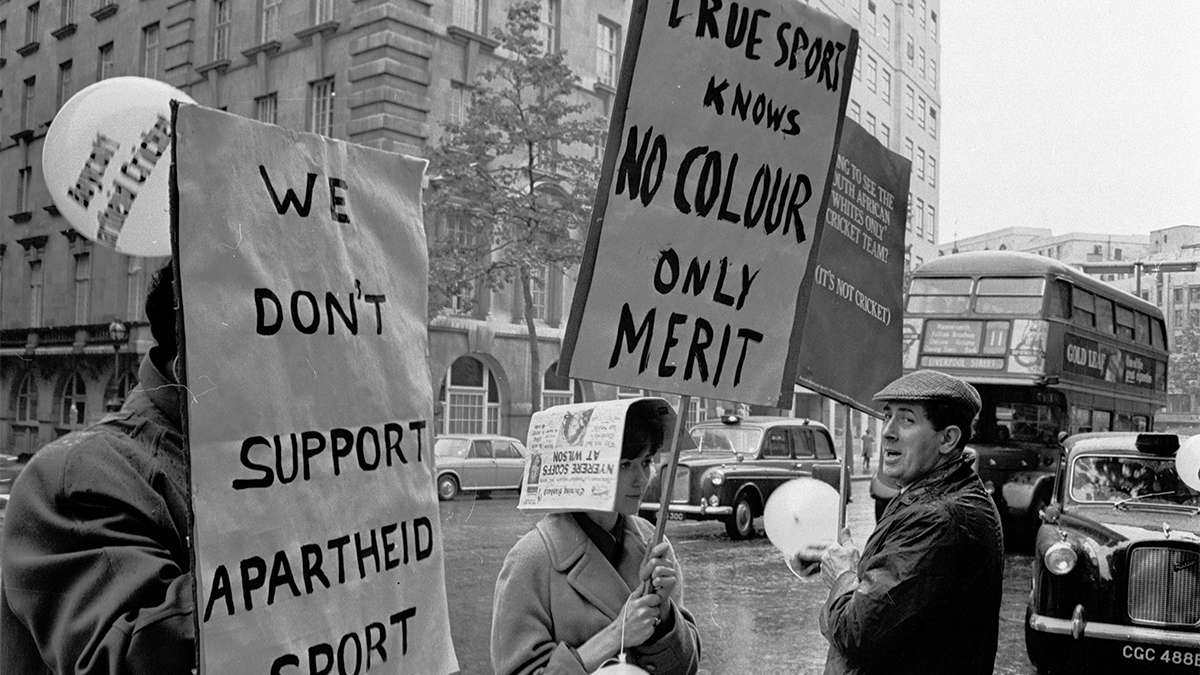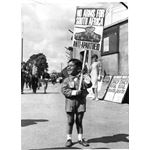
The #SpyCopsInquiry starts again this morning, hearing from Lord Peter Hain.
He was involved in campaigning against apartheid.
As his opening statement says:
#spycops
(1)
He was involved in campaigning against apartheid.
As his opening statement says:
#spycops
(1)
"From the 1960s onwards, the international movement against the Apartheid regime in South Africa was one of the world’s largest social movements. Abhorrence at the racist and murderous regime was shared by people aroundthe globe."
(2)
(2)
"They formed campaigns in support of those in South Africa who were struggling for change and people in Britain played a central rolein campaigning for, and eventually achieving,that change"
(3)
(3)
"It is an historic embarrassment, and should be a matter of deep regret,that the SDS chose to target those anti-apartheid campaigners for surveillance through the use of undercover officers (‘UCOs’)."
(4)
(4)
"What many in the world realised, but the SDS failed to appreciate,was that the true threat to democracy came from the Apartheid regime rather than those fighting against it."
(5)
(5)
His witness statement goes into more detail. You can now download it from ucpi.org.uk/publications/f…
And you can watch today's hearing at
(6)
And you can watch today's hearing at
(6)
As well as his involvement in the anti apartheid movement, Hain was involved with the Young Liberals. He served as a member of its National Executive between 1973-75 and then as President from 1975-77.
(7)
(7)
Hain chaired the Stop The Seventy Tour (STST) campaign from its launch in Sept 1969 – disbanded in late May 1970.
(8)
(8)
He was also involved in the Action Committee Against Racialism 1970-73
And a founder member and press officer for the Anti Nazi League (ANL)
(9)
And a founder member and press officer for the Anti Nazi League (ANL)
(9)
Joined Labour Party in Sept 1977 then elected as an MP in 1991.
(10)
(10)
He was then a Government Minister for 5 years & Cabinet Minister for 7 years
This meant that he signed off “on work of utmost sensitivity” - he signed warrants for surveillance and interception, he saw intelligence reports produced by the police/ security services/ GCHQ/ MI5
(11)
This meant that he signed off “on work of utmost sensitivity” - he signed warrants for surveillance and interception, he saw intelligence reports produced by the police/ security services/ GCHQ/ MI5
(11)
Hain has been a Privy Councillor since 2001, and a member of the House of Lords since 2015
(12)
(12)
Asked about the AAM
he explained that
“for 50 years or so it was a bitter long hard struggle and we were in a minority, and people take it for granted that everybody was against apartheid because it was such a detesteable institution of racism like the world has never seen"
(13)
he explained that
“for 50 years or so it was a bitter long hard struggle and we were in a minority, and people take it for granted that everybody was against apartheid because it was such a detesteable institution of racism like the world has never seen"
(13)
You've quite correctly depicted it as a movement that was in a minority, albeit with a large reservoir of public sympathy
(14)
(14)
The South African State presented itself as a bulwark against communism, and it suited its purposes to be seen as part of the 'democratic West'.
Of course it went against all the principles of democracy as the vast majority of the population was denied the right to vote.
(15)
Of course it went against all the principles of democracy as the vast majority of the population was denied the right to vote.
(15)
"We were on the side of justice and equality and human rights, and the apartheid regime was on the wrong side of all those issues” he said.
The Western governments supported the regime by supplying it with arms, continuing to trade with it, opposing sanctions etc
(16)
The Western governments supported the regime by supplying it with arms, continuing to trade with it, opposing sanctions etc
(16)
Peter grew up in South Africa.His parents were from conventional white South African families but “very unusually took a stand against the apartheid system” and were forced into exile as a result. They moved to Britain in 1966, and lived in Putney.
(17)
(17)
In documents produced by the Met police, his parents are described as communists.
Peter says this is not true, his parents were never members of the Communist Party, and this is typical of the kind of distortions that appear in #spycops reports.
(18)
Peter says this is not true, his parents were never members of the Communist Party, and this is typical of the kind of distortions that appear in #spycops reports.
(18)
The Inquiry moved on to discuss the 'Wilf Isaacs Eleven tour'.
Isaacs was a businessman - and SA Army Officer - who sponsored a cricket tour of Britain in 1969.
(19)
Isaacs was a businessman - and SA Army Officer - who sponsored a cricket tour of Britain in 1969.
(19)
Hain was 19 at the time; he says he is proud to recall the pitch invasion he organised in Basildon on 5th July 1969.
As far as he knows, this was the first non violent direct action (NVDA) that took place against a SA cricket team
(20)
As far as he knows, this was the first non violent direct action (NVDA) that took place against a SA cricket team
(20)
David Barr QC (appearing for the Inquiry) asked Hain more about 'non violent direct action' (NVDA).
“I see it as having a long lineage going back to the suffragettes, to early trade unionists, to the Chartists protesting for the vote, … (21)
“I see it as having a long lineage going back to the suffragettes, to early trade unionists, to the Chartists protesting for the vote, … (21)
...to Mahatma Gandhi in India protesting against British colonial rule and for Indian independence."
He finished reminding us that it's carried out by Extincition Rebellion and other envrironemntal protests today.
(22)
He finished reminding us that it's carried out by Extincition Rebellion and other envrironemntal protests today.
(22)
Peter noted that he was not (at first) prosecuted for taking part in these protests, but was later subject to a private prosecution.
They were not doing anything unlawful, he says – pointing out that trespassing on the pitch was not a criminal offence. (23)
They were not doing anything unlawful, he says – pointing out that trespassing on the pitch was not a criminal offence. (23)
“If it's part of your line of argument that you're seeking to suggest that NVDA has a subversive periphery, I reject that"
He want on to talk more about 'civil disobedience.'
'(24)
He want on to talk more about 'civil disobedience.'
'(24)
Nelson Mandela himself told Hain that the Stop the Seventy Tour was “fundamental in changing the nature of the Anti Apartheid Movement, in galvanising it and in ultimately bringing down the downfall of apartheid"
(25)
(25)
Barr said he sought to clarify that there were other groups (like the AAM) who carried out “conventional mainstream protest”, and this differed from the kind of direct actions taken by the STST.
(26)
(26)
Hain confirmed that he wrote a book in 1971, called 'Don't play with apartheid'.
He makes the point that the police could have been catching people traffickers and organised serious criminals, rather than pursuing people like him and his Young Liberal colleagues.
(27)
He makes the point that the police could have been catching people traffickers and organised serious criminals, rather than pursuing people like him and his Young Liberal colleagues.
(27)
Barr then read an account of a cricket pitch having been dug up three days before an action.
Hain says pitch-digging didn't happen at Basildon, or at the other Wilf Isaacs matches. His siblings invaded a pitch at Roehampton; this wasn't dug up.
(28)
Hain says pitch-digging didn't happen at Basildon, or at the other Wilf Isaacs matches. His siblings invaded a pitch at Roehampton; this wasn't dug up.
(28)
He recalled other examples of sports matches being protested, eg a Davis Cup tennis match.
Hain is proud to have instigated, organised and led such direct action. He doesn't claim sole responsibility – many thousands of people participated in these protests.
(29)
Hain is proud to have instigated, organised and led such direct action. He doesn't claim sole responsibility – many thousands of people participated in these protests.
(29)
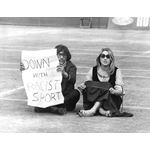
Things were becoming more racist in South Africa before the STST campaign – with opponents of the regime being banned and jailed and harrassed by the State. The STST helped to reverse that.
(30)
(30)
The objectives are in the name: to stop the cricket tour being planned for summer 1970.
However the Springboks then announced a rugby tour in Oct 1969, so the campaigners turned their attention to that, with the aim of dissuading the 1970 cricket tour from going ahead
(31)
However the Springboks then announced a rugby tour in Oct 1969, so the campaigners turned their attention to that, with the aim of dissuading the 1970 cricket tour from going ahead
(31)
Hain says “this was a campaign which lifted off out of nowhere" - it suddenly became massive; it was spontanous and decentralised, with autonomous groups in different places, and no central control.
He provided leadership & leaflets but did not organise all these events
(32)
He provided leadership & leaflets but did not organise all these events
(32)
The Hain family's (small) flat became the de facto headquarters for the STST campaign - meetings were held there, their phone number became the national campaign contact, his mother became the group's unoffical secretary.
"How big was your living room?" asked Barr
(33)
"How big was your living room?" asked Barr
(33)
Barr read out a list of grorps affiliated with the campaign.
Hain made a point of adding the United Nations Youth Student Association to this list .
He was then asked about the various communist groups listed (the International Socialists, Young Communist League etc)
(34)
Hain made a point of adding the United Nations Youth Student Association to this list .
He was then asked about the various communist groups listed (the International Socialists, Young Communist League etc)
(34)
Hain said it was no secret that the network included all kinds of groups – both communists and Christians.
Hain explained that his philosophy “has always been – you bring in the broadest spectrum of opinion that you can that share in common a single objective...”
(35)
Hain explained that his philosophy “has always been – you bring in the broadest spectrum of opinion that you can that share in common a single objective...”
(35)
That objective might be to oppose apartheid, or racism.
Hain talked more about the committee – he knew some members reasonably well (like Alan Brooks from the AAM)
(36)
Hain talked more about the committee – he knew some members reasonably well (like Alan Brooks from the AAM)
(36)
There were 25 Spirngboks fixtures and a plan for 12 cricket matches – originally they'd planned for 24 cricket matches but cut the number in half in Feb 1970 – Peter believes this was a sign of their campaign's success at that stage.
(37)
(37)
He recalled the case of cricketeer Basil D'Oliveira
He wasn't allowed to play in South Aftrica, but started playing for the England team while living here in exile. He was then excluded from taking part in the England team's 1968 tour of South Africa.
(38)
He wasn't allowed to play in South Aftrica, but started playing for the England team while living here in exile. He was then excluded from taking part in the England team's 1968 tour of South Africa.
(38)
This had made it very clear to young Peter that the English cricket authorities were on the side of apartheid and supported the racist form of cricket that operated in South Africa at the time.
(39)
(39)
Hain still stands by every word of the letter being discussed.
He says “we've got to understand the context that we were operating”
(40)
He says “we've got to understand the context that we were operating”
(40)
“I mean, I'm sure that you wouldn't be, nor Sir John be on the side of apartheid” he asserted.
“You would therefore be with us in sentiment, I hope”
(41)
“You would therefore be with us in sentiment, I hope”
(41)
Some activists used weedkiller to get their message across.
'Oxford Rejects Apartheid' appeared in 5 foot tall letters on the Oxford University Cricket pitch.
“I was never a fan of spraying weedkiller anywhere” says Hain.
(42)
'Oxford Rejects Apartheid' appeared in 5 foot tall letters on the Oxford University Cricket pitch.
“I was never a fan of spraying weedkiller anywhere” says Hain.
(42)
He pointed out that the Oxford AAM intended to use the same NVDA tactics that had been so successful in opposing the Wilf Isaacs tour, but on a larger scale.
(43)
(43)
Barr insisted that there must have been a “potential for violence” because emotions must have been “running high on
both sides”.
Hain refutes this thinking – reconnting various incidents where he and others used purely non-violent tactics.
(44)
both sides”.
Hain refutes this thinking – reconnting various incidents where he and others used purely non-violent tactics.
(44)
Hain mentioned his belief that SA intelligence operatives was infiltrated (and secretly recorded) the AGM – and that they collaborated with the British Special Branch.
(45)
(45)
“Don't scrum with a racist bum” became a much-loved slogan following protests at Heathrow Airport in October 1969.
The Springboks first training session was also protested by STST – the Hain family discovered that this was due to happen near their home
(46)
The Springboks first training session was also protested by STST – the Hain family discovered that this was due to happen near their home
(46)
The AAM organised a demo at South Africa House where the team were due to attend an evening reception.
(47)
(47)
Hain agreed that they would use tactics that went “beyond the conventional”” but made the point strongly that this “doesn't make them violence” - he hopes that the Inquiry is capable of making such a simple distinction.
(48)
(48)
Hain made the point that the Anti Apartheid movement suffered extreme violence from the South African State. This included the bombing and arson attacks on their offices, letter bombs sent to their homes (Peter himself was sent one – it was opened by his teenage sister)
(49)

(49)

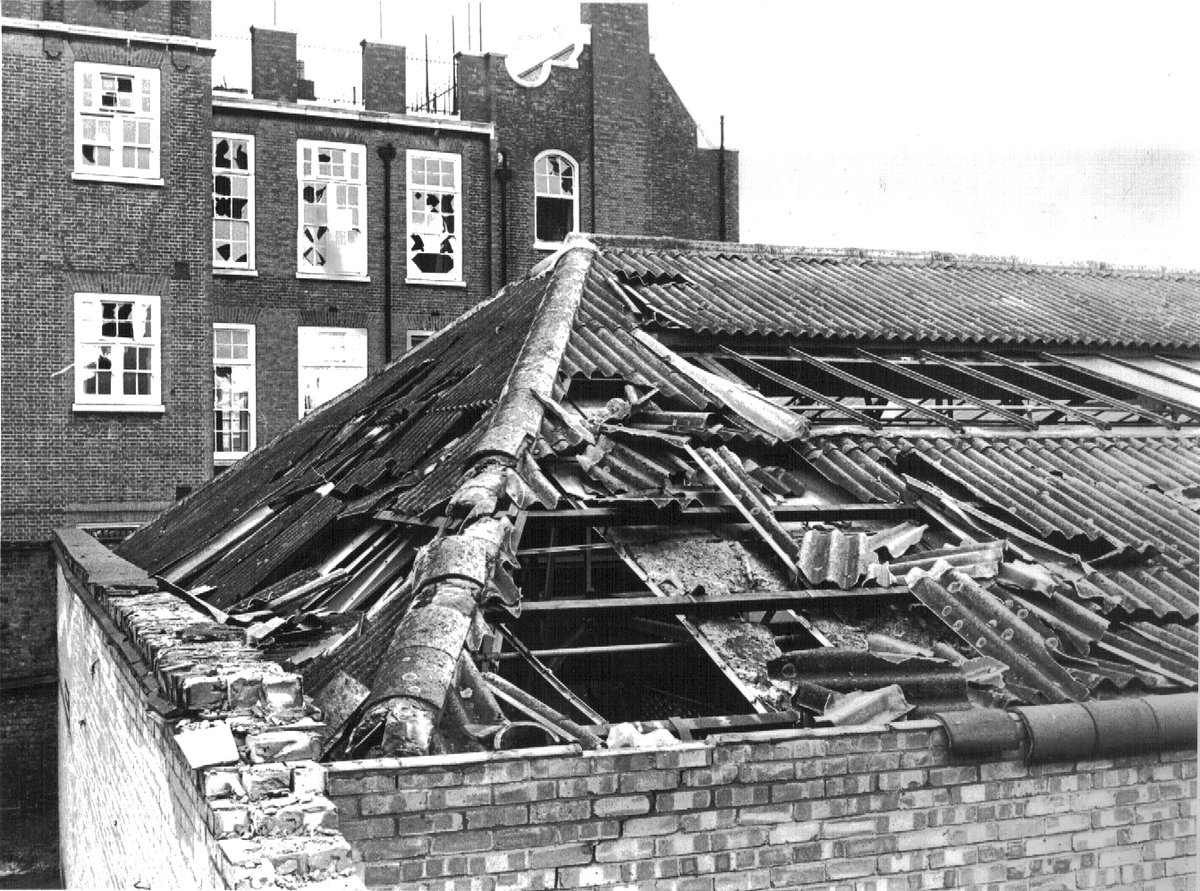
He agreed that things 'went wrong' in Swansea in November 1969. This is described in Peter's book. Vigilantes responded violently towards the protestors and some of them were badly hurt, by stewards as well as police.
(50)
(50)
At the time, he wrote that somebody could be killed. Barr asked him if this was hyperbole on his part? Hain said no, at the time he was genuinely concerned about the way the situation had developed.
(51)
(51)
The Ad Hoc Committee met (at the Hain flat) on 5th December 1969
Asked for the entry qualifications for entry to this group, Hain said “people I trusted”.
(52)
Asked for the entry qualifications for entry to this group, Hain said “people I trusted”.
(52)
He believes that this group was never infiltrated. None of its activities are reported on (at least not in any of the documentation that he has now seen), nothing they planned was ever leaked or thwarted.
(53)
(53)
Ernest Rodker and Jonathan Rosenehead were both part of that trusted inner group.
(54)
(54)
He recollects that the December meeting was mostly to plan the upcoming protests at Twickenham.
Hain still has not been shown any photographs of Mike Fergusson, so is unable to recal much about this officer (whose cover name we do not know).
(55)
Hain still has not been shown any photographs of Mike Fergusson, so is unable to recal much about this officer (whose cover name we do not know).
(55)
ucpi.org.uk/publications/s…
We are shown a document from 1969 [UCPI0000008656] a report of that December meeting . It was attended by about 6 people. Barr read from the report.
(56)
We are shown a document from 1969 [UCPI0000008656] a report of that December meeting . It was attended by about 6 people. Barr read from the report.
(56)
Barr asked him about some of the tactics that the group used
and asked if they had deliberately misled anyone (by suggesting that all their protests would be hed at the cricket ground, itself, for example?
(57)
and asked if they had deliberately misled anyone (by suggesting that all their protests would be hed at the cricket ground, itself, for example?
(57)
Hain told the story of one activist dressed in a suit, who managed to drive away the team's coach (for a short time, until he was forced to a halt by members of the rugby team, and assaulted by them.
(58)
(58)
As far as Hain knows, tin-tacks were only sprinkled on a pitch once – at a protest in Bristol – when a school teacher spontaneously did this.
(59)
(59)
Hain made it clear that he was opposed to this tactic, it wasn't used anywhere else.
This is yet another example of Mike Fergusson lying and exxagerating about the campaign.
(60)
This is yet another example of Mike Fergusson lying and exxagerating about the campaign.
(60)
There were no instances of planned violence at all.
All of these people were organising spontaneously.
Did this justify the actions of #apycops like Fergusson, and the level of intrusion suffered by Peter and his family?
(61)
All of these people were organising spontaneously.
Did this justify the actions of #apycops like Fergusson, and the level of intrusion suffered by Peter and his family?
(61)
“Why were the police not targeting the agents of apartheid bombings, who were killing and acting illegally and violently in London at this time?” he asked
“What they should have been doing was helping bring down the apartheid system”.
(62)
“What they should have been doing was helping bring down the apartheid system”.
(62)
Page 144 of Hain's book describes the protests that followed the Spinrgboks to Dublin. 10,000 people marched, led by Bernadette Devlin MP
This was the biggest demo of the entire tour, organised by two SA exiles, and also the biggest demo seen in Dublin since the Troubles.
(63)
This was the biggest demo of the entire tour, organised by two SA exiles, and also the biggest demo seen in Dublin since the Troubles.
(63)
Weedkiller was applied to the 'outfield' at Worcester. This is described in Hain's book too. So are incidents of messages being painted at sports grounds.
(64)
(64)
Barr asked if it was likely that the police “faced with these novel, rather effective tactics”...
Hain cut him off : “I know what you're trying to insinuate, but our plans were quite public.”
(65)
Hain cut him off : “I know what you're trying to insinuate, but our plans were quite public.”
(65)
They wanted to disrupt the tour using NVDA and were entirely transparent and honest about their intentions.
"Why was an undercover officer in virtually every meeting?” he asked. The campaign's plans were no secret.
(66)
"Why was an undercover officer in virtually every meeting?” he asked. The campaign's plans were no secret.
(66)
Among the novel tactics we heard about included an intriguing example of a special dye that looked white at first, but turned black later– the activists had an idea of somehow using this to make a point about skin colour.
(67)
(67)
Next up was [UCPI 00000 31845]
ucpi.org.uk/publications/t…
According to this transcript of the 'True Spies' TV programme, Mike Fergusson's handler was Wilf.
(68)
ucpi.org.uk/publications/t…
According to this transcript of the 'True Spies' TV programme, Mike Fergusson's handler was Wilf.
(68)
Barr quoted from page 12 – an interview with a former #spycop:
“I don't think Peter Hain ever realised that he had a police officer as his number 2”
(69)
“I don't think Peter Hain ever realised that he had a police officer as his number 2”
(69)
Hain refutes this – he never had a 'number 2'.
He thinks the #spycops routinely lied in their reports. The tin-tacks stories are just one example of this.
(70)
He thinks the #spycops routinely lied in their reports. The tin-tacks stories are just one example of this.
(70)
Barr asked if it is possible that Wilf was suffering from “some confusion“, 30 years after the events he described.
Hain was very clear that “would be a a charitable description”
(71)
Hain was very clear that “would be a a charitable description”
(71)
You can read more about the True Spies programmes and Mike Fergusson here: specialbranchfiles.uk/true-spies-sto…
undercoverresearch.net/2019/11/18/wha…
(73)
undercoverresearch.net/2019/11/18/wha…
(73)
He only remembers one person being excluded/ disinvited from attending meetings of the group, and it was not done in the way the #spycops describe.
(74)
(74)
Mike Brearly was “courageous” says Hain.
He was the only cricketer to make a public stand in support of the STST campaign. John Taylor was the only rugby international player to do the same.
(75)
He was the only cricketer to make a public stand in support of the STST campaign. John Taylor was the only rugby international player to do the same.
(75)
Brearly attended the STST AGM in March 1970.
We are shown the #spycops report
[UCPI 00000 08660] report on this.
ucpi.org.uk/publications/s…
(76)
We are shown the #spycops report
[UCPI 00000 08660] report on this.
ucpi.org.uk/publications/s…
(76)
Hain believes that the #spycops were trying to push a false narrative about a secretive second strand of the campaign – who wanted to use more violent tactics - which just didn't exist.
(77)
(77)
Capitalism is designed to create a rich elite at the top and great impoverishment down below”
He has always wanted a fairer, more just, economic system.
(which is why he joined the Labour Party)
Again, no secret
(78)
He has always wanted a fairer, more just, economic system.
(which is why he joined the Labour Party)
Again, no secret
(78)
The British capitalist system supplied arms to South Africa. It was more interested in profit and trade than in decency and human rights, says Hain
(79)
(79)
According to the report, Pater Hain warned the AGM's attendees that they should all be aware of the real risk that their campaign was infiltrated by agents of the State.
(80)
(80)
The South African exiles all knew about the way the apartheid State's security services operated, and knew of the collaboration between them and the British security services/ Special Branch.
(81)
(81)
“The SA security services were responsible for a great deal of illegal violent activity and attacks on anti-apartheid activists”, as Hain reminded the Inquiry.
(82)
(82)
He clarified that when he spoke of infiltration at that AGM, he was thinking about the SA spies as well as the possibility of British ones.
(83)
(83)
{UCPI0000014399]
ucpi.org.uk/publications/s…
Barr read out a section from page 2 – “delegates were urged to set up local groups”. Hain doesn't see why this was an issue; of course they wanted more groups and more action!
(84)
ucpi.org.uk/publications/s…
Barr read out a section from page 2 – “delegates were urged to set up local groups”. Hain doesn't see why this was an issue; of course they wanted more groups and more action!
(84)
He was asked what the group planned to do with all that energy (of the supporters) once they disbanded. Hain explained that he promoted membership of the AAM.
(85)
(85)
Hain made the point that pro-apartheid racist organisations had attacked the anti-apartheid activists.
(86)
(86)
The 1970 Commonwealth Games were due to take place in Edinburgh. As more and more countries threatened to boycott them, there was a real possibility that they would end up being a pretty much all-white affair, and very politically damaging for the British.
(87)
(87)
The cricket tour was cancelled.
Barr asked a hypothetical question: if it hadn't been cancelled, would the planned protests have gone ahead?
Oh yes, said Hain. He gave examples of the kinds of exciting tactics the activists had come up with.
(88)
Barr asked a hypothetical question: if it hadn't been cancelled, would the planned protests have gone ahead?
Oh yes, said Hain. He gave examples of the kinds of exciting tactics the activists had come up with.
(88)
Again Barr asked is this would have meant a “risk of evincing the sort of violent reaction that we saw at Swansea?”
Hain rejected this. He said this campaign was one of the only examples of NVDA being so entirely successful.
(89)
Hain rejected this. He said this campaign was one of the only examples of NVDA being so entirely successful.
(89)
This success was very important for the momentum of what was a global movement vs apartheid
(90)
(90)
Barr tried to insinuate that this all meant that the Young Liberals were therefore a youth wing of a mainstream political party committing criminal acts
Hain tried to question this approach.
“I'm afraid I have to ask you the questions” said Barr
(92)
“I'm afraid I have to ask you the questions” said Barr
(92)
Barr came up with an example of the kind of 'minor' criminality he meant – sitting down on a zebra crossing. Hain was happy to admit that he had done this.
(93)
(93)
“I don't think this is the focus of this Inquiry” he responded, when asked if this had caused any 'tension' within the Liberal Party.
(94)
(94)
What is wrong with NVDA? asked Hain.
“You gave it a label 'criminal' and then when I pressed you 'minor criminal'”
(95)
“You gave it a label 'criminal' and then when I pressed you 'minor criminal'”
(95)
“When it comes to progressive radical movements, whether it's environmentalists today, whether it is anti-racism, Black Lives Matter, whether it''s Greenpeace, Extinction Rebellion of the AAM of its era, we are all presented as disruptive or objectionable” he complained
(96)
(96)
Barr seems to suggest that if a group uses NVDA and commits very minor criminal acts sometimes, that might be a justification for #spycops to attend their meetings
Hain obviously disagrees with this.
(97)
Hain obviously disagrees with this.
(97)
He talks about how undercover policing gets to the point where instead of catching the racists responsible for Stephen Lawrence's death they infiltrate the Stephen Lawrence campaign instead”
(98)
(98)
[UCPI 00000 08240]
ucpi.org.uk/publications/s…
The Putney Young Liberals met at Hain's family home (now in a different house)
'Mike Scott' (HN298) was elected as Membership Secretary. Hain does not recall this person, so thinks he must have operated under another name then.
(99)
ucpi.org.uk/publications/s…
The Putney Young Liberals met at Hain's family home (now in a different house)
'Mike Scott' (HN298) was elected as Membership Secretary. Hain does not recall this person, so thinks he must have operated under another name then.
(99)
Joanne, Peter's sister, was 15 in January 1962. His other sister, Sally, was 13.
Does Hain have any concerns about the #apycops reporting on children?
Yes he does. His sisters might have viewed themselves as teenagers rather than children at that time...
(100)
Does Hain have any concerns about the #apycops reporting on children?
Yes he does. His sisters might have viewed themselves as teenagers rather than children at that time...
(100)
But he does have concerns about “disproportionate, politically biased policing here”.
He doesn't understand why 'Mike Scott' was in this meeting at all, how this could be justified by his superiors, and what he was doing with two young woman teenagers”.
(101)
He doesn't understand why 'Mike Scott' was in this meeting at all, how this could be justified by his superiors, and what he was doing with two young woman teenagers”.
(101)
We next heard about the Campaign for Repeal of Immigration Act. (CRIA)
Hain does not remember the meeting referred to in this next document {UCPI 00000 07658] – an SDS report on an individual involved in this campaign.
ucpi.org.uk/publications/s…
(102)
Hain does not remember the meeting referred to in this next document {UCPI 00000 07658] – an SDS report on an individual involved in this campaign.
ucpi.org.uk/publications/s…
(102)
It mentions this person and details their employment and telephone number.
It appears that they had been in touch with Peter to see if the Young Liberals would support CRIA.
(103)
It appears that they had been in touch with Peter to see if the Young Liberals would support CRIA.
(103)
Hain makes the point:
Whether or not we agree with the aims of campaign groups, why should the police be sent to spy on them?
(104)
Whether or not we agree with the aims of campaign groups, why should the police be sent to spy on them?
(104)
Peter noted that 'Sandra' told this Inquiry that she could have been doing much more valuable things with her time.
She said that there was a very different view towards the women's movement then compared to today.
(105)
She said that there was a very different view towards the women's movement then compared to today.
(105)
In the course of his time in politics, Hain worked with many undercover officers.
He calls them “ a precious resource of great skill” and “brave people” and talks about their work in combatting terrorism and bombings and assassinations...
(106)
He calls them “ a precious resource of great skill” and “brave people” and talks about their work in combatting terrorism and bombings and assassinations...
(106)
What on earth are they doing involved in arguments about racism or women's rights or environmental pollution?
(107)
(107)
Mitting came on screen to explain that Barr's questions were a mixture – some of them supplied by the police lawyers, for example – so it would be a misconception to assume that these represent the line of thinking of the Inquiry itself.
(108)
(108)
Mitting thinks that Wilf (who is now dead) was trying to portray the SDS in a good light (and in an entertaining fashion) in the True Spies programme.
(109)
(109)
The Inquiry will start again after lunch, at 14:05 - which means it'll be back on Youtube from 14:15 onwards - at
#spycops
(110)
#spycops
(110)
• • •
Missing some Tweet in this thread? You can try to
force a refresh



